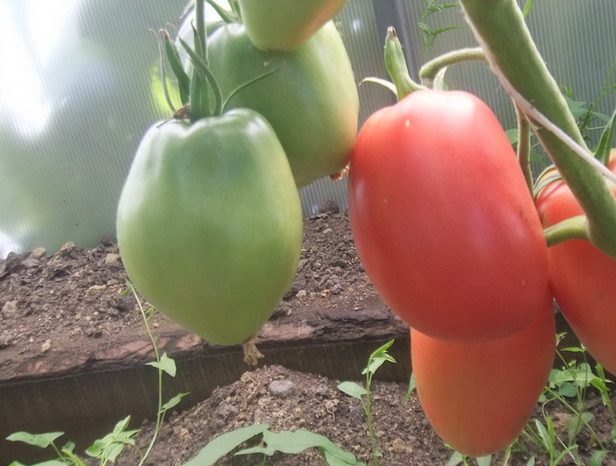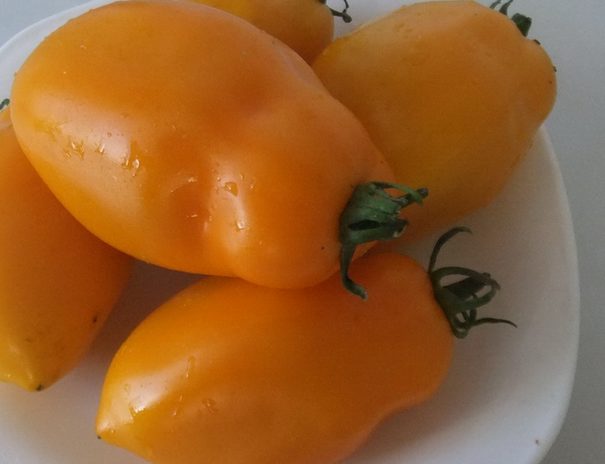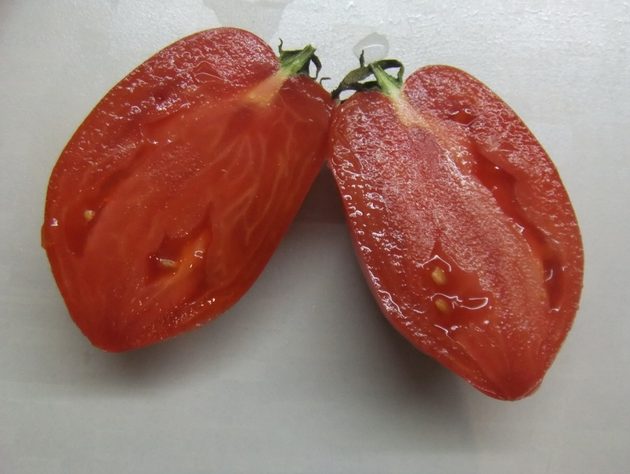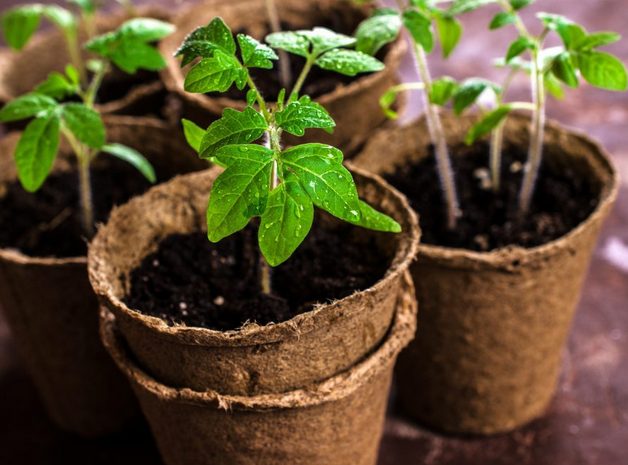Content
Tomato Minusinskie glasses was bred in the Krasnoyarsk Territory by residents of the city of Minusinsk. It belongs to the varieties of folk selection. Differs in endurance, tomato can grow in the Urals and Siberia.
Description of the tomato variety Minusinskie glasses
Minusinski glasses are indeterminate varieties, suitable for growing in greenhouses, have an average ripening period and an extended fruiting period. The fruits weigh on average 200-250 g, have a good sweet-sour taste and a pleasant tomato aroma.
The plants are tall with dark green leaves and small yellow flowers, collected in a cluster. They seem fragile due to thin shoots, they need a garter to support. Stepsons are formed in large numbers, they must be removed and plants formed into one stem. This is enough to get a good harvest. The fruits begin to ripen in early July.
Varieties of varieties
There are several varieties of tomatoes Minusinskie glasses, they differ in the color of the fruit. You can choose a variety with red, orange or pink tomatoes, elongated plum-shaped.
Tomato minusinski pink glasses
Tomato variety Minusinskie pink glasses are mid-season. It has large, elongated plum-shaped fruits. The mass of one tomato is 100-300 g. The pulp is fleshy with a small amount of seeds and juice, the skin is bright pink. The taste is sweet with a pleasant sourness. The characteristic tomato aroma is well expressed.
Bushes are tall, indeterminate, in need of tying and pinching. Preferred shaping in 1-2 trunks. Ripe fruits of the Minusinskie pink glasses are eaten fresh, they are made into thick tomato paste and sauces.
Tomato minusinsk orange glasses
Tomatoes Minusinskiy glasses are orange in shape and resemble large elongated plums. Fleshy pulp with a small number of seeds has no voids, firm, sweet. The mass of one fruit is from 200 to 350 g, on the upper clusters - 100-200 g. Small tomatoes can be canned, large ones are used to prepare salads, hot snacks, sauces and pastas. The orange tomato variety is suitable for allergy sufferers.
Differs in high resistance to diseases, tomato is picky about feeding, good lighting and watering.
Tomato minusinsk glasses red
Tomatoes of the Minusinskiy red glasses are classified as salad, medium ripening. Tall plants - up to 2-2.5 m. Red plum-shaped fruits have excellent taste. Average weight - about 200 g.
Tomato varieties Minusinskiye cups red is suitable for growing in greenhouses, in the southern regions it can also be planted in the open field. Tomatoes need tying and pinching. Form them into 1-2 stems.
Main characteristics
Tomato variety Minusinskie cups has an average ripening period. The first crop in unheated greenhouses ripens in July. The yield is average - 3.5-4 kg of tomatoes can be harvested from one bush.
The variety is resistant to diseases, with proper care, watering and feeding, it grows intensively and gives a good harvest. The fruits do not crack. In the middle lane, it is grown only in greenhouses. Outdoor planting is possible in the Southern regions.
Advantages and disadvantages
The variety has a stable yield.From 4 to 8 fruits ripen on one brush, more than 4 kg of tomatoes can be harvested from one bush. The advantages of the Minusinskie cups variety also include the excellent taste of ripe tomatoes and a beautiful presentation. The advantage is a prolonged fruiting period, disease resistance.
The disadvantages of the Minusinskiy glasses variety of tomatoes, judging by the photos and reviews, include the increased sugar content of the fruits. Therefore, tomatoes are rarely canned, they are often eaten fresh, salads and hot snacks, sauces and pasta are prepared from them.
Planting and care rules
For growing tomatoes in an unheated greenhouse, seeds are sown in the third decade of February or the first decade of March. For open ground, seedlings are sown in late March - early April.
Planted tomatoes need care - watering, fertilizing, mulching the soil, removing weeds, protecting against diseases and pests. Immediately after planting, the stems are tied to a trellis using synthetic materials that do not cause rotting.
During the ripening of the crop, attention must be paid to top dressing. For long-term fruiting of indeterminate varieties, which include, according to the description and photo, the Minusinskiy glasses variety of tomatoes, lowering the main stem from the support is carried out.
Sowing seeds for seedlings
Before sowing, it is advisable to sort the seeds by density in a 3% salt solution (1 tablespoon per 1 liter of water). Then rinse in running water and soak for 20 minutes in a 1% solution of potassium permanganate, rinse again.
Sowing soil is prepared from turf, humus and peat mixed in equal proportions. To give the substrate lightness, river sand (1/5 of the total volume) and a handful of wood ash are added to it. The soil mixture is steamed or calcined for disinfection, spilled with a fungicide solution (Fitosporin, Fundazol, Trichodermin, etc.).
The order of sowing seeds and growing seedlings:
- The seeds are laid out in a row at a distance of 1 cm or planted in separate glasses.
- A layer of soil 0.5-1 cm thick is poured on top and the crops are covered with a film.
- Place in a warm place with a temperature of +24 ° C.
- Sprouted seeds should sprout on day 3, and not germinated - on day 5-6.
- Seedlings are freed from shelter, placed on a light windowsill or under additional lighting.
- The temperature is lowered to 16 ° C for 5 days, then raised again to + 20-22 ° C.
- Moisten the soil as it dries.
- Seedlings from a common container or cassette dive into separate containers, in the phase of two true leaves.
Approximately 3 weeks after the first pick, when the roots of the seedlings completely fill the volume of the containers, a second transplant is carried out into large containers. To prevent the development of root rot, a biological fungicide tablet is placed in each container.
Transplanting seedlings
When 8 true leaves appear on the seedlings, 60 days after sowing, it can be transplanted to a permanent place. The soil and air by this time should warm up to +18 ° C.
Seedlings are transplanted with an earthen clod, watered and mulched the soil around the bushes with peat, straw or cut grass. As a mulch after watering, you can use humus in an equal mixture with turf soil and a handful of ash.
Tomato care
According to reviews and photos, many factors influence on obtaining a good harvest of tomato varieties Minusinskie glasses:
- temperature;
- soil and air moisture;
- top dressing;
- the formation of bushes.
First of all, you need to remove the stepsons.
Tomatoes can grow strongly without pinching.New shoots grow from the axils of each leaf to the detriment of fruit formation. Indeterminate varieties, which include the Minusinskiy cups tomatoes, have unlimited growth, they are formed into one stem, removing all stepsons, and tied to a trellis.
The tomato requires constant moisture in the root layer of the soil. The need for watering increases during flowering, setting and fruit formation. The bushes are watered 2-3 times a week at the same time. Watering rate - from 5 to 15 liters per 1 sq. m.
For the establishment of flower buds, nitrogen and phosphorus fertilizers are required. The lack of these elements leads to the formation of weak flowers, the absence of ovaries. Regular watering will contribute to good plant nutrition. Once every 2 weeks, it is useful to apply a complete complex fertilizer, consisting of:
- urea (5-10 g);
- superphosphate (20-30 g);
- potassium sulfate (15-20 g) per 10 liters of water.
Air humidity affects the pollination of plants, for tomatoes it should be in the range of 50-70%. At low humidity, the pollen is sterilized, and at high humidity it swells and also becomes incapable of fertilization. Even if self-pollination was successful and ovaries formed, this does not guarantee a high yield. Unripe fruits can fall off due to high air temperatures or lack of water in the soil.
Weakened plants are more susceptible to various diseases - rot and late blight. As a preventive measure, weekly treatments with Fitosporin are carried out. To help tomatoes against shedding flowers, spraying with a solution of boric acid (1 g per 1 liter of water) is recommended.
Conclusion
Tomato Minusinskie glasses is an interesting variety of folk selection. Its fruits are attractive for their unusual shape, size and excellent taste. If you make an effort, follow the rules of agricultural technology, you can harvest a good harvest of healthy and tasty tomatoes.












